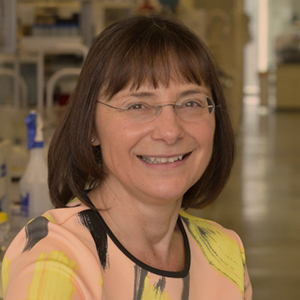
Karen Vousden
Karen received her BSc and Ph.D. in Genetics from Queen Mary College at the University of London working with Lorna Casselton, followed by postdoctoral fellowships with Chris Marshall at the Institute of Cancer Research in London and Douglas Lowy at the National Cancer Institute in the USA. She then became head of the Human Papillomavirus group the Ludwig Institute for Cancer Research in London before moving back to the NCI in 1995, where she was Director of the Molecular Virology and Carcinogenesis Section at the ABL-Basic Research programme and then Chief of the Regulation of Cell Growth Laboratory. In 2002 she returned to the UK to become the Director of the CRUK Beatson Institute in Glasgow, moving back to London in 2016 to take up the role of Chief Scientist at CRUK and Group Leader at the Francis Crick Institute.
Karen's research focuses on metabolic changes that contribute to cancer development, with a focus on the tumour suppressor protein p53. She has made contributions to our understanding of how p53 is regulated and the functions of p53 that contribute to its ability to control cancer progression. This work has revealed an unexpected ability of p53 to help cells adapt and survive under transient periods of nutrient starvation. Ultimately, the hope is to find ways to translate this research for cancer therapy.
Karen has been elected as a Fellow of the Royal Society, the Royal Society of Edinburgh, the Academy of Medical Sciences, EMBO, the European Academy of Sciences, the American Association of Cancer Research and the American Academy of Arts and Sciences. She has also received honorary DScs from the Universities of London and Strathclyde and is an honorary Fellow of the Royal College of Physicians and Surgeons (Glasgow). Karen’s awards include the Tenovus Gold Medal, the Sir Frederick Gowland Hopkins Medal, the Royal Medal from the Royal Society of Edinburgh and the Mike Price Gold Medal from the EACR. She was made a Commander of the British Empire for services to clinical science.